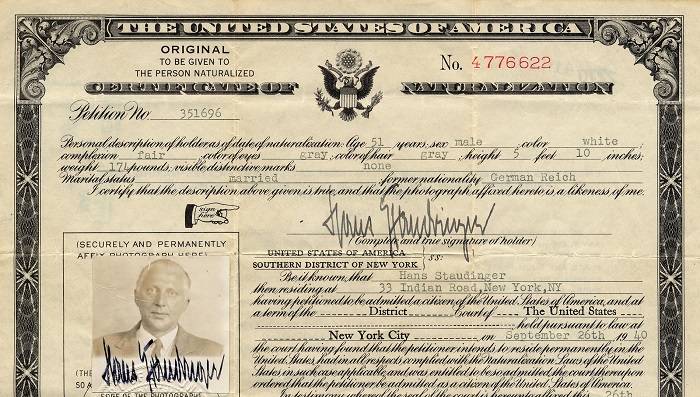Collections : [German and Jewish Intellectual Émigré Collections]
German and Jewish Intellectual Émigré Collections
Personal and professional papers of German-speaking Émigré in the social sciences, humanities, and the arts and the organizations which assisted those who fled the Nazi regime.
Search Constraints
Start Over You searched for: Online Content Online Content Remove constraint Online Content: Online Content Collecting Area German and Jewish Intellectual Émigré Collections Remove constraint Collecting Area: German and Jewish Intellectual Émigré Collections Date range 1980 to 1984 Remove constraint Date range: <span class="from" data-blrl-begin="1980">1980</span> to <span class="to" data-blrl-end="1984">1984</span>Search Results
Alfred C. Oppler Papers, 1908-1982 2.75 cubic ft.
This series contains autobiographical and biographical materials, including documents, curriculum vitae, appointment books, membership cards and awards, as well as documents concerning Friedländer's position at the Deutsche Zentrale für freie Jugendwohlfahrt in Berlin, as well as later teaching appointments at the University of Chicago, University of California, Berkeley, and Michigan State University. Included in the early documents from Berlin are his dismissal papers from the Deutsche Zentrale für freie Jugendwohlfahrt in 1933, documentation of his years in Switzerland and France, 1933-1936, affidavits and letters of support in preparation for his immigration to the U.S. in 1937. Also included in this series are several autobiographical statements, which document the development of social welfare and social welfare education in Germany and the United States.
This series contains some documents from Herz's early years in Düsseldorf, includes notebooks from his university courses in Freiburg im Breisgau, Berlin and Heidelberg, as well as documents from his years in Geneva, Switzerland (1935-1938). A large portion of this series is devoted to Herz's autobiographical writings, including travelogues, interviews of Herz by others, and several versions of his autobiography, published in German in 1984 as Vom Überleben. Wie mein Weltbild entstand, and the unpublished English version, On Human Survival.
This series contains documents, several selections of diary entries, photographs and curriculum vita of Bates. The documents pertaining to Roy C. Bates (Kurt Bauchwitz) date from 1890 to 1974 with later documents pertaining to Barbara Bates (third wife), which date through 1995. Included in the collection are many early documents such as birth certificates, early school documents, marriage certificates from Bates/Bauchwitz' first two marriages in Germany, as well as university and military service documents. Also in the collection are a number of documents which record Bates/Bauchwitz' legal career as well as his subsequent dismissal from his post by the Hitler regime in 1938. His period of flight from Nazi Germany is also well-documented, as well as his early years in the U.S., including his naturalization as a U.S. citizen in 1946. Also included in this section are documents pertaining to his university studies in the U.S. at Columbia, St. John's and New York Universities. Completing the biographical section of this series are a number of curriculum vita, several biographical statements prepared for planned editions of Bates' poetry, as well as a number of photographs.
The series is arranged in three sub-series: general correspondence of Eugen Spiro, 1903-1913 and 1941-1972; correspondence with owners and subjects of Spiro paintings; and correspondence of Lilly Spiro, primarily dating from the years after Eugen's death, 1972-1985. Among the noteworthy correspondents are: Tilla Durieux, Albert Einstein, George Grosz, Theodor Heuss, Otto Loewi, Thomas Mann, Dimitri Mitropoulos, Albert Schweitzer and Gottfried Reinhard Treviranus.
